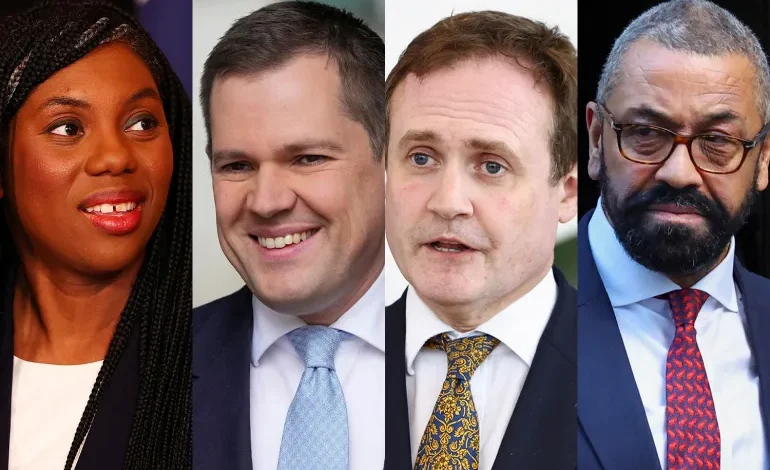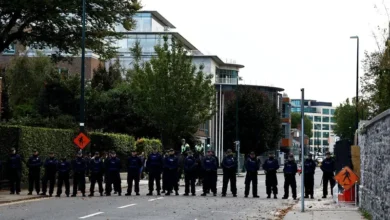‘Hugely significant’: Who’s in the race to become UK Conservatives leader?

An outspoken 44-year-old who counts Margaret Thatcher as her hero, an ex-immigration minister who quit after claiming the controversial Rwanda scheme did not go “far enough”, a former soldier who jokes that he “invaded a country” when he served in Iraq, and a gaffe-prone Brexiteer who made a bad-taste remark about a date rape drug,
In that relative order, Conservative politicians Kemi Badenoch, Robert Jenrick, Tom Tugendhat and James Cleverly are vying in the United Kingdom for what has been dubbed the worst job in politics: leader of the opposition.
The hopefuls will make their cases at the Conservative Party Conference in Birmingham, which began on Sunday and will continue until Wednesday.
Rishi Sunak, the former prime minister, resigned as leader of the Conservatives after their disastrous performance in the July 4 general election. Priti Patel, a former home secretary and ex-cabinet minister Mel Stride were knocked out in earlier rounds of voting by Conservative MPs.
Those legislators will vote on October 9 and 10 to whittle the contest down to two candidates. Those belonging to the party membership, estimated to be more than 170,000 people, will then cast their ballots.
What’s at stake?
The stakes are high in the wake of the party’s worst electoral defeat since its foundation in 1834, a major blow for the Conservatives who had until July led government for more than a decade.
Now, there are just 121 Conservative MPs in Parliament against Labour’s 404 seats, compared with the pre-election Conservative majority of 365.
“The [Conservative leadership] election is hugely significant and will have major consequences for the future of British politics and the country,” Toby James, professor of politics and public policy at the University of East Anglia, told Al Jazeera. “The new leader will have the opportunity to shape the direction of the party – which has been one the most successful electorally in the world.”
But as they get used to life in the shadows, the Tories are divided.
While some top Conservatives believe now is the time to appease voters who abandoned them in favour of Nigel Farage’s hard-right Reform movement, others talk of a return to the kind of middle-ground politics cultivated by former premier David Cameron.
What went wrong for the Conservatives?
The final years of Conservative rule were marred by scandal and chaos as the government struggled to manage the UK’s departure from the European Union and the COVID-19 pandemic.
Cameron resigned in 2016 after his bid to keep the UK in the EU failed and was succeeded by Theresa May. Then came Boris Johnson, Liz Truss and lastly, Sunak.
“The contest is difficult to predict,” said James. “There are now only a very small number of Conservative MPs in Parliament … A small number of votes shifting between MPs could therefore have decisive effects on the campaign.
“When leadership candidates campaign to be leader, their audience is the Conservative Party MPs and members who get to vote. When they campaign to be prime minister, the electorate is the whole country. Their first task will therefore need to be widening the appeal of the party beyond the core base. This will require a listening exercise with the public to understand why the party had such a catastrophic result in July.”
Who are the candidates, and what are they promising?
Badenoch promises to “lead and renew” the Conservatives. According to her campaign, she believes in “meritocracy” and rejects “attempts to force us into identity groups”.
Often in the headlines for wading into charged issues such as transgender rights and colonialism, Badenoch has been described as outspoken and has been accused of workplace bullying. Staffers of the Department for Business and Trade she used to run claim the office was toxic, that her behaviour was “traumatising” and that she played favourites, the Guardian reported. She has denied the allegation.
Badenoch wants to ban so-called conversion therapy, is against what she calls “identity politics”, and has downplayed the role of colonialism in the UK’s wealth. Margaret Thatcher, she says, is her political hero.
At the British LGBT Awards this year, the Doctor Who actor David Tennant took aim at Badenoch, who was then equalities minister, over her position on transgender issues. Tennant said he hoped for a world where she “doesn’t exist any more”, and said she should “shut up”.
Born in London to Nigerian parents, she spent her childhood years in Lagos.
She became an MP in 2017 and in 2022, made her first bid for Conservative leader after Johnson quit. She came fourth, which was considered an achievement given her relative lack of experience.
She told the right-wing channel GB News last month that Britons who voted for the populist, anti-immigration movement Reform, were “our people”, an apparent attempt to appease them, and claimed to be “very right-wing but also very pragmatic”.
James Cleverly: Gaffe-prone party loyalist
Former Home and Foreign Secretary Cleverly, 54, was born to a Sierra Leonean mother who migrated to London to become a midwife, a personal story he has shared during his career, and an English father who worked as a surveyor.
Cleverly joined the army after leaving private school, but after sustaining a leg injury during training, he held jobs in publishing before becoming an MP.
He’s an old ally of Boris Johnson, backed Brexit, and wants to revive the Rwanda scheme scrapped by the current Labour government. The policy, heavily criticised by rights groups, would have seen people identified by the UK as undocumented migrants and refugees sent to the African nation for asylum processing.
He doesn’t shy away from topics such as racism and has warned his party against trying to make a “passable impression” of Farage in order to recover from the election.
He termed the killing of George Floyd in the US as a “terrible and unacceptable act” and criticised football fans who booed at players who took the knee amid the Black Lives Matter protests. He wants to win support from the UK’s Black communities but has acknowledged the Conservatives have been in the grips of a divisive “psychodrama”.
He’s calling for party unity, lower taxes and higher military spending.
Cleverly has pitched himself as a centrist, according to the right-wing Telegraph newspaper, and is known as an affable politician. He’s popular among the public, a recent poll shows.










